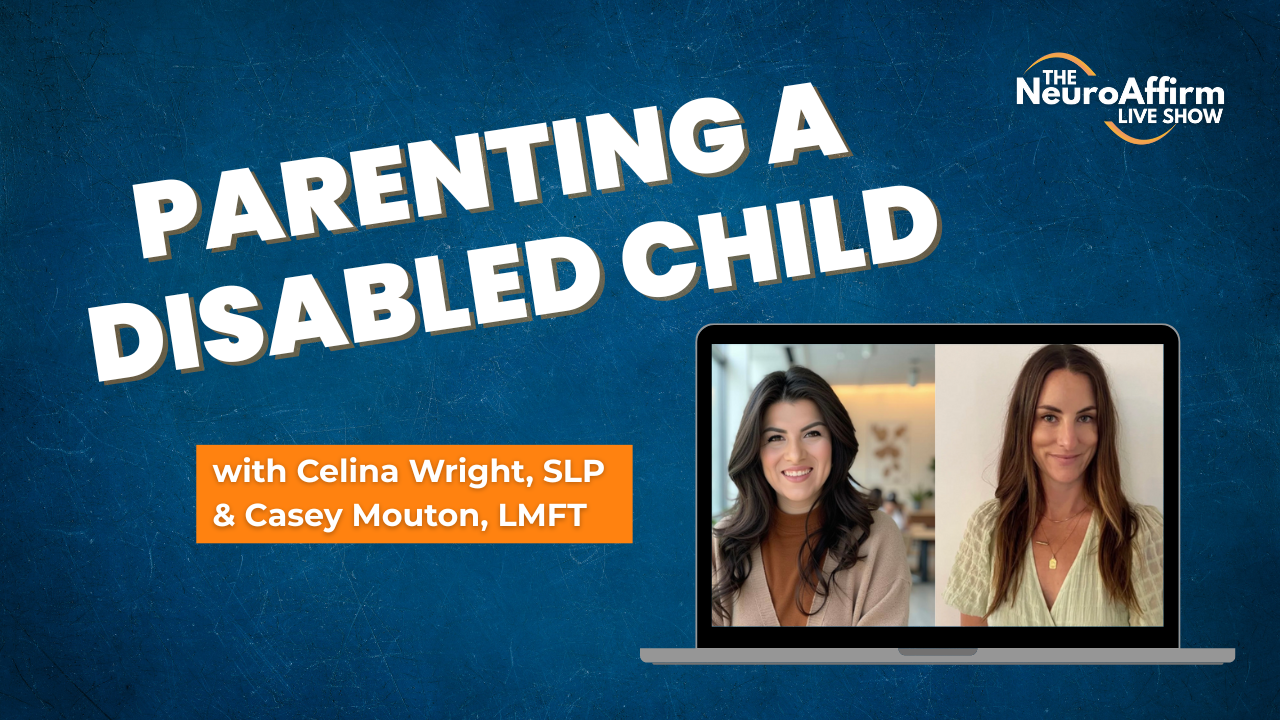Supporting Parents Through Burnout: What Clinicians Need to Know

I’ve owned a speech therapy clinic for over 11 years and what I’ve learned from my clients and their families is that parenting a disabled or neurodivergent child isn’t just a “full-time job.”
It’s a never-ending balancing act between therapies, doctor appointments, meltdowns, insurance calls, and still trying to be a regular human being.
During a recent live show with SLP Celina Wright and LMFT Casey Mouton – both clinicians and parents of disabled children – we talked about the reality of parental burnout and what clinicians can do to truly support families through it.
As Celina put it perfectly:
“Between therapies, doctors’ appointments, and trying to keep it all together, burnout wasn’t a ‘maybe’ – it was inevitable.”
And for many parents, that’s the truth. Burnout isn’t a sign of failure; it’s an almost guaranteed outcome in a system that demands everything and gives very little in return.
So the real question for us as clinicians is: how can we support parents through burnout – without adding more to their plate?
First, we can help by recognizing the indicators of burnout.
You might notice a parent suddenly stops showing up to sessions, takes longer to reply to messages, or just seems different than how they usually are.
From the clinician’s side, that can look like “lack of commitment.” But pause before jumping to that conclusion.
Because here’s the thing – they might be in burnout right now. And they might not know it.
It doesn’t mean they don’t care. It might just mean they’re maxed out, setting a boundary, or simply don’t have any capacity left.
As Celina stated during the show, “Recognizing burnout might not keep it from happening, but it can help you address it.”
Casey Mouton, parent of a disabled child and LMFT, shared a simple but powerful idea she uses with her own clients: create a self-care plan before the hard moments hit.
She asks parents, “What can you do to support yourself after a big event?” – whether that’s an IEP meeting, a doctor’s appointment, or any emotionally heavy day.
When you notice those early signs of burnout, try checking in gently with questions like:
“How are you going to take care of yourself after the IEP meeting next week?”
Or, “That doctor’s appointment sounds like a lot – what’s your recovery plan afterward?”
And this isn’t just something to ask parents – clinicians can model it, too.
When you know stressful events like progress reports or re-evaluations are coming, prepare yourself emotionally and let families know ahead of time. Transparency builds trust.
Burnout happens faster when too many things are happening at once – too many appointments, expectations, and emotions all colliding.
Casey shared that she knows she’s in burnout when she feels herself craving isolation.
Every parent has their own tells.
That’s why part of our role is to help parents recognize what burnout looks like for them.
Another way we can help prevent burnout, for the parents and the kids, is to use a strengths-based approach.
When every conversation revolves around what’s not working or what still needs to improve, parents can start to internalize that constant deficit talk.
Over time, it chips away at their confidence.
But when we highlight what is working – when we remind them of the progress, the effort, and the resilience – we’re not just supporting the child’s growth. We’re protecting the parent’s self-esteem.
Another way we can support parents in burnout is by helping them practice better self-care. Because we can’t pour from an empty cup. And sometimes, parents need that reminder. That they can (and should!) take time for themselves.
Because here’s the truth: ‘self-care’ doesn’t always mean bubble baths and yoga retreats.
For Casey, it’s watching reality TV.
For Celina, it’s diving headfirst into work and focusing on what she can control.
Self-care is deeply personal.
Our job isn’t to prescribe what self-care should look like. It’s to create space for parents to figure out what helps them feel grounded and effective.
Finally, we can support parents during burnout by helping them build their community.
When burnout hits, isolation tends to follow. That’s why community matters more than ever.
Encourage parents to connect with others who “get it” – whether that’s through local parent groups, online spaces, or professional communities.
And if you’re part of our NeuroAffirm Therapy Academy, don’t forget it’s not just for clinicians – it’s a place where parents and professionals can come together to share ideas, decompress, and support one another.
Sometimes, just being able to say, “Me too” can be the first step toward healing.
We might not be able to stop burnout from happening.
Burnout will happen – it’s part of being human in a demanding system. But with awareness, compassion, and community, we can make sure parents don’t have to face it alone.
As clinicians, we have the privilege of being that steady presence in their storm.
Sometimes that means offering a resource.
Sometimes it just means giving them permission to take a breath.
Either way, our impact matters.
If you want to hear more tips from Celina & Casey about supporting parents during burnout, check out this episode of the NeuroAffirm Live Show: Ep. 106 – Supporting Parents Facing Burnout Hosted by Celina Wright SLP Ft. Casey Mouton LMFT

